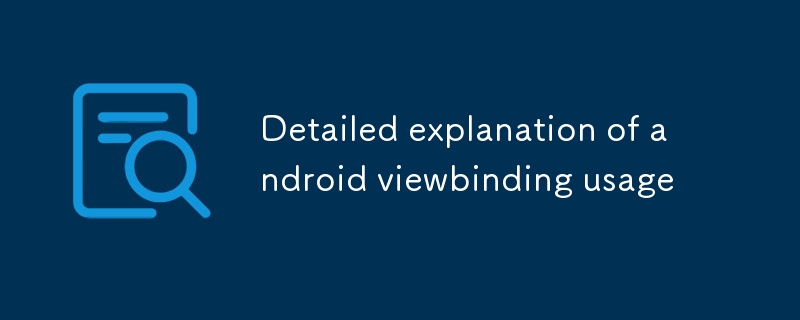안드로이드 뷰바인딩 사용법에 대한 자세한 설명
This article discusses performance optimizations for Android View Binding. It highlights techniques to minimize inflate operations, cache inflated views, use synthetic constructors, and leverage '<include>' tags. It also explores advant

Optimizing Android View Binding for Performance
To optimize Android View Binding for performance, consider the following techniques:
-
Avoid binding inflate operations in loops: Inflate operations can be expensive, so avoid calling
inflate()multiple times for the same layout. Instead, store the inflated object in a variable and reuse it as needed. - Cache inflated views: Once a view is inflated, cache it and reuse it instead of inflating it multiple times. This is especially beneficial for views that require complex initialization or are frequently displayed.
-
Use synthetic constructors: Android Studio can generate synthetic constructors for views, which can improve performance and reduce compile times. Enable synthetic access in your project's
gradle.propertiesfile by settingandroid.enableSelfDestruct=true. -
Consider using
<include>tags: If you have common UI elements that are used across multiple layouts, consider using<include>tags to reduce inflation overhead.
Advantages and Disadvantages of Android View Binding
Advantages:
- Improved code safety: View binding eliminates the need for findViewById() calls, reducing the risk of NullPointerExceptions and providing compile-time safety.
- Simplified code: View binding generates boilerplate code automatically, simplifying the layout process and reducing the amount of code you need to write.
- Enhanced performance: Compared to traditional findViewById() calls, view binding inflates layouts faster and avoids costly reflective calls.
Disadvantages:
- Increased binary size: View binding generates additional class files for each layout, which can increase the size of your APK.
- Limited flexibility: View binding is strongly tied to specific layouts, making it less flexible than manual findViewById() calls.
- Potential performance issues: Inflating complex layouts with many nested views can still lead to performance issues, even with view binding.
Handling Complex View Hierarchies with Android View Binding
To handle complex view hierarchies with Android View Binding:
- Use nested binding: Create a binding class for each child view and then nest them within a parent binding class. This allows you to access child views in the parent view's binding object.
- Split large layouts into fragments: If you have a particularly large or complex layout, consider splitting it into multiple fragments. This can improve performance and make it easier to manage.
- Utilize view binding delegates: Consider using libraries like ViewBindingDelegate or ButterKnife to delegate the creation of bindings to a separate class. This can help with performance and organization.
위 내용은 안드로이드 뷰바인딩 사용법에 대한 자세한 설명의 상세 내용입니다. 자세한 내용은 PHP 중국어 웹사이트의 기타 관련 기사를 참조하세요!

핫 AI 도구

Undresser.AI Undress
사실적인 누드 사진을 만들기 위한 AI 기반 앱

AI Clothes Remover
사진에서 옷을 제거하는 온라인 AI 도구입니다.

Undress AI Tool
무료로 이미지를 벗다

Clothoff.io
AI 옷 제거제

Video Face Swap
완전히 무료인 AI 얼굴 교환 도구를 사용하여 모든 비디오의 얼굴을 쉽게 바꾸세요!

인기 기사

뜨거운 도구

메모장++7.3.1
사용하기 쉬운 무료 코드 편집기

SublimeText3 중국어 버전
중국어 버전, 사용하기 매우 쉽습니다.

스튜디오 13.0.1 보내기
강력한 PHP 통합 개발 환경

드림위버 CS6
시각적 웹 개발 도구

SublimeText3 Mac 버전
신 수준의 코드 편집 소프트웨어(SublimeText3)




